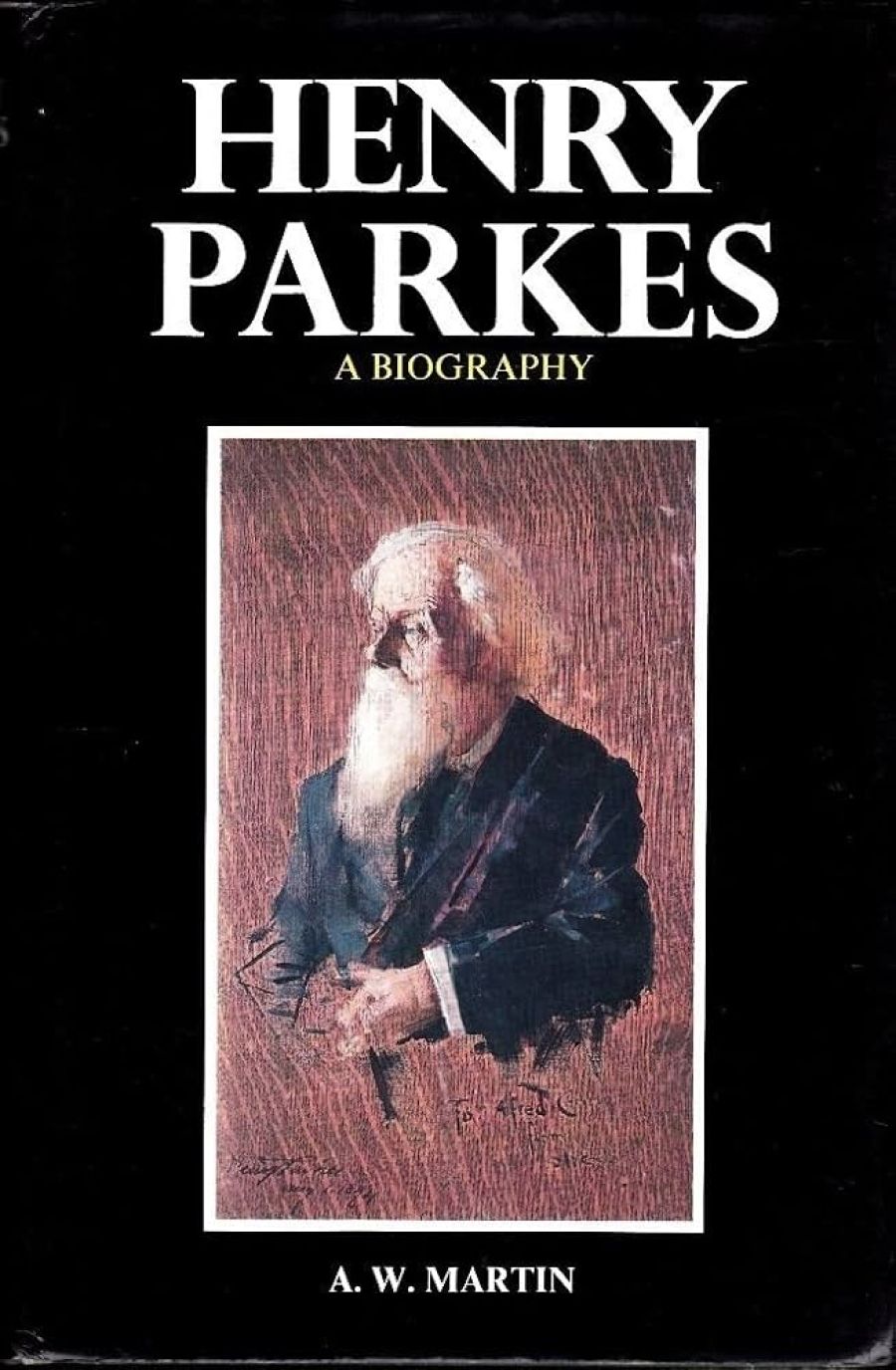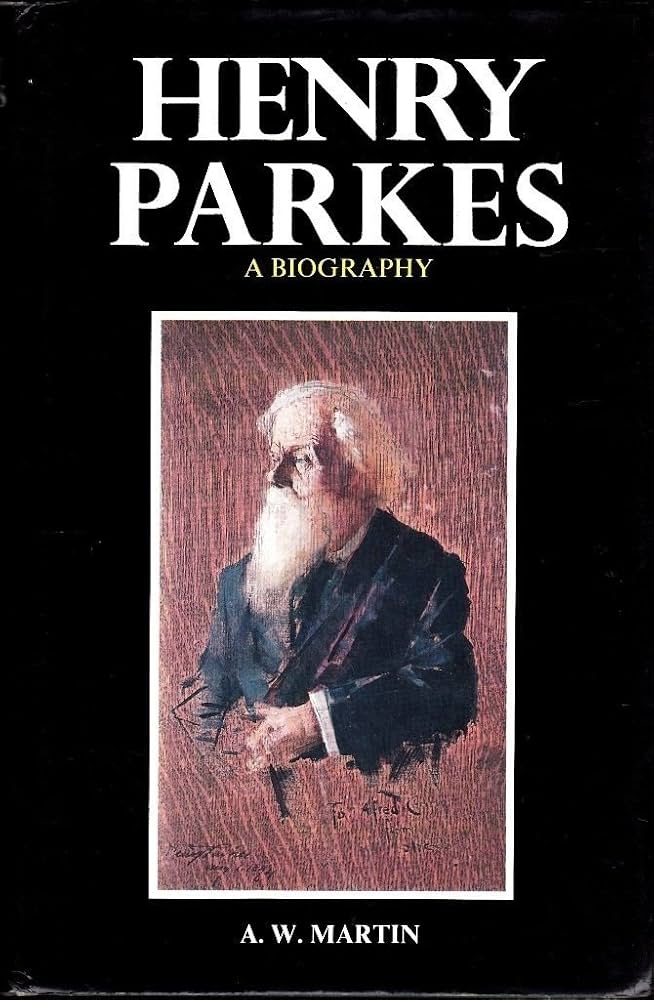
- Free Article: No
- Contents Category: Biography
- Review Article: Yes
- Article Title: The Colonial Sphinx
- Online Only: No
- Custom Highlight Text:
Notwithstanding recent expressions of disaffection with large-scale narrative biography (e.g., James Walter's biography of Whitlam), I remain a devotee of the genre. In Australia, our communal sense of identity, our historiographical debates and our literature are diminished by the infrequency of such works.
- Book 1 Title: Henry Parkes
- Book 1 Subtitle: A Biography
- Book 1 Biblio: MUP, $29.80 hb, 482 pp
- Book 1 Cover Small (400 x 600):

- Book 1 Cover (800 x 1200):

Perhaps the most we can except of such scholarly biography is that it landscapes anew the contours of the outer life, mines the accessible veins of subterranean inner life (a high-risk job), and cleans the overburden of legend and publicity. To achieve these aims, and remain coolly readable, is a considerable achievement. But Martin reaches beyond the genre by ruffling one’s expectations of a ‘definitive’ Life.
One reason for the infrequency of good narrative biography here is the professorial ‘star system’ in academic history. Key historical figures have been expropriated by key professors, often for decades. This book follows La Nauze’s Deakin. Fitzhardinge’s Hughes, and other fruits of this intellectual squattocracy. One hopes it is the last. Through the always lucid detail of Parkes one senses Martin’s poignant struggle with the burdensome professorial persona, his effort to imbue historical Narrative with psychological and sociological insights.
The preface states that Martin once aspired to the model of ‘systematic biography' advocated in A. F. Davies’s essay ‘The Tasks of Biography’ (reprinted in Essays in Political Sociology in 1972). Without explaining why, Martin describes his return to narrative form as ‘something of an intellectual and artistic defeat', but he hopes all is not lost.
Can psycho-social theories systematically be applied to biographies of the dead? Is Martin’s ‘defeat’ an affair for his private conscience, a revelation of the rigidity of professional historical training, or a methodological inevitability? Does the discipline of narrative prohibit explorations of the subject’s cultural and psychological formation, his social structural milieu? Can any (relevant) theory of personality be grounded into a biographical narrative?
In one major area Martin’s account is unquestionably successful: the fusion of Parkes’s career as a professional politician in an era of unpaid MP’s with a masterly analysis of the changing structure of political organisation; from factionalism to ‘the emergence of the Australian party system’, from the squatters to the rise of Labor, from patrician politics to populism, from responsible government almost to Federation. Parkes is the ideal vehicle for an analysis of a half-century’s political evolution. He made major contributions, often under-emphasised by Martin, to statecraft, to institutions which survive to this day (the penal and education systems), and to the theoretical problems of the state. The felicitousness of this conjunction of hero and historical change in no sense detracts from Martin’s achievement. He has pioneered a new direction in Australian historical sociology, as well as a new kind of depth biography.
In Parkes’s personal and familial relationships Martin has uncovered fascinating material. While he found intractable problems of evidence in tracing Parkes’s business and, even more, sexual affairs, Martin nevertheless conveys a complexity of character usually denied to Australian politicians as a type. Through sub-narratives, Parkes emerges as a man obsessed with patriarchal and paternalistic visions, both in the microcosm (the family) and in the macrocosm (the colony and ‘the nation’), but tragically (sometimes melodramatically) frustrated by a kind of masculine impotence (his business failures), by the fate of humble origins, and by the peculiar viciousness of Australian perceptions of politicians as a status-group.
No-one can blame Martin for failing to investigate the psychogenesis of Parkes’s grandiose fantasies, but he offers rich materials for an assessment of how far they were, or were not, realised. Although understandably keen to quote the daughter Menie’s trenchant letters to Parkes, Martin might have attempted a more thorough assessment of his achievements from the point of view of Australia’s political and social problems today.
Martin quotes often passionate and highly intelligent extracts from Parkes’s diaries and correspondence which suggest that his grasp of his own and the colony’s problems was quite atypical of his period.
Most moving are Parkes's expressions of the typical defence mechanisms of the democratic leader – the ideology of ‘statesmanship’ – and his characteristic forms of guilt: constant dealing in ‘the ashes of life’, the wish for permanent institutional achievement rather than mere word-spinning, the morbid imprisonment in Parliament itself and in the hustings (the medium), and at the end, what Deakin described as Parkes’s ‘vast and inexpressible weariness’.
Another theme – duly exploited by Parkes’s enemies – is his struggle for economic security and social honour. Martin’s narrative embodies a psychosocial portrait of the parvenu, the immigrant, the ‘mechanic’ turned shopkeeper who could lament ‘I would as soon sell Dung as Divinity if I could only make money by selling it’. Yet Parkes cultivated his social superiors (Governors, author-celebrities like Carlyle and Tennyson, and Sydney merchants). He ended his life siding with men of ‘education, property and social consideration’, and opposed to the untrustworthy ‘illiterate and inexperienced’ classes. Tragically, he was then, in his words, ‘steeped in unmitigated poverty’.
Earlier, Parkes’s daughter Menie asked to be taken ‘beneath politics’, to know the real Henry Parkes. Thirty years on, observing the legend, the G.O.M. of colonial politics, Alfred Deakin uncannily raised the same problem. He wondered ‘where the actor posture-maker and would-be sphinx ended or where the actual man underneath began’. As Martin shrewdly realises, no simple or ‘systematic’ solution to this perplexity exists in the case of Parkes. While clearly an agnostic towards concepts of ‘genius’ or even ‘greatness’ (the title is not Sir Henry), Martin takes us deeper into the riddles of our most haunting colonial sphinx than any other writer has dared.


Comments powered by CComment